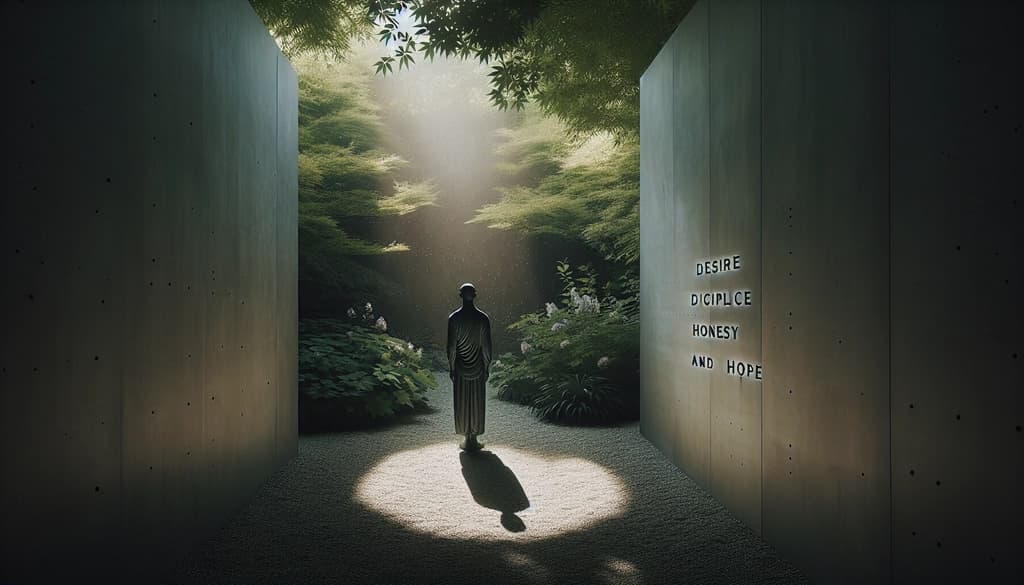Self-Restraint as a Living Art: Understanding, Walking the Middle Path, and Nurturing Inner Honesty

What Is Self-Restraint? Beyond Denial and Toward Presence
To ask what is self-restraint is to walk into a living paradox. It is not mere self-denial or rigid command over every impulse. Instead, self-restraint is the willingness to pause at the crossroads between wanting and doing, to feel the heat of longing without letting it consume or decide for you. Imagine a musician hearing a discordant note in her mind, choosing to wait, hands hovering above the keys, until the melody returns to harmony.
True self-restraint is that spacious pause, the breath between urge and action, where awareness can grow roots—a practice not of rejection, but of gentle holding and deeper listening. In many ways, it draws on the living energy of virtue: a quiet capacity for discernment and care that supports your practice of wellbeing.
How to Walk the Middle Path: Neither Excess Nor Harsh Renunciation
On the path of spiritual maturity, the question of how to walk the middle path often arises. This middle path—praised in ancient wisdom—is not a balancing act of repression and indulgence, but a living, breathing investigation. To walk the middle path is to sense, moment by moment, what brings harmony, what leans toward suffering, and what restores you to a state of open-hearted presence.
You might try pausing before any habitual reaction—whether it’s an extra bite, a sharp word, or a retreat into distraction—breathing into the space where choosing becomes possible. In that pause, there is courage not to tip toward extremes, but a gentle curiosity about what truly nourishes. If you want to go deeper, you might explore the principles of right action in buddhism, which help ground this middle way in daily, compassionate intention.
Inner Honesty: Meeting Yourself Without Armor
Inner honesty is the quiet willingness to see yourself as you are: impulses, contradictions, and all. It is not confession for shame’s sake, but a clear-eyed look inward that neither inflates nor diminishes what’s here.
In the dance of self-restraint, inner honesty is the music—a steady rhythm, telling you when you bend toward avoidance, or when resistance turns brittle. Every time you meet yourself gently, truthfully, without scolding or flattery, you strengthen the roots of your own integrity. To foster this honesty, learning about how to cultivate humility may soften the inner gaze with understanding and warmth.
Spiritual Maturity: The Ripening of Gentle Strength
Spiritual maturity is less about perfection and more about a growing intimacy with your own mind and heart. You may notice that as honesty deepens, the grip of compulsion softens. Choices are no longer battles of will, but gentle negotiations between old patterns and new understandings.
You begin to sense that restraint, when chosen with compassion, is not deprivation but the flowering of freedom. Like a tree sending roots deeper for the sake of fruit, you learn to withhold in ways that allow the heart to open rather than harden. Through the lens of living with integrity, these choices become a daily act of spiritual devotion.
Aligning with Moral Values: Integrity as Everyday Practice
To align with moral values is not to adopt someone else’s code or measure yourself only by outer standards. Instead, it is an ongoing, living inquiry: What matters most deeply, not just in thought but as a felt texture in your life? Where does your own kindness tug at you when you stray, and how might you listen to its quiet guidance?
Sometimes, exploring spiritual ethics in daily life sheds light on these small moments—a word you choose not to speak, a purchase you decline out of conscience, a habit you revisit with fresh compassion. Over time, these gestures weave themselves into a fabric you can trust: a daily expression of who you wish to be.
"In the hush between temptation and action, he learned to recognize his own trembling—neither fighting nor fleeing, but sitting beside his longing as an old friend. There, in the gentle light of honesty, he discovered restraint not as a prison, but as an open field where new choices could breathe."
The Quiet Impact: Relationships, Clarity, and Self-Trust
As the practice of self-restraint matures, it begins to ripple outward. Relationships feel steadier, less fraught with regret or hidden motives. Clarity brightens the inner landscape, and trust in oneself grows—not because every battle is won, but because each meeting with yourself is more honest, more forgiving.
Science may call this impulse control or emotional regulation. Yet beneath those terms lies a very human longing: to be both free and whole, able to live by what feels truly right in your bones. When you discover what is equanimity, you may notice how steadiness and acceptance deepen the lived experience of self-restraint and honesty.
If compassion is the heart, perhaps self-restraint is the bones that support it. For a richer understanding of this kindness, you can further reflect on how to practice compassion and how tenderness toward your struggles slowly becomes tenderness extended toward the world.
May you find in the pauses not deprivation, but possibility. May inner honesty guide you gently along the middle path, and may self-restraint become less a burden than an invitation—to live as you deeply wish to live, one small moment at a time.
